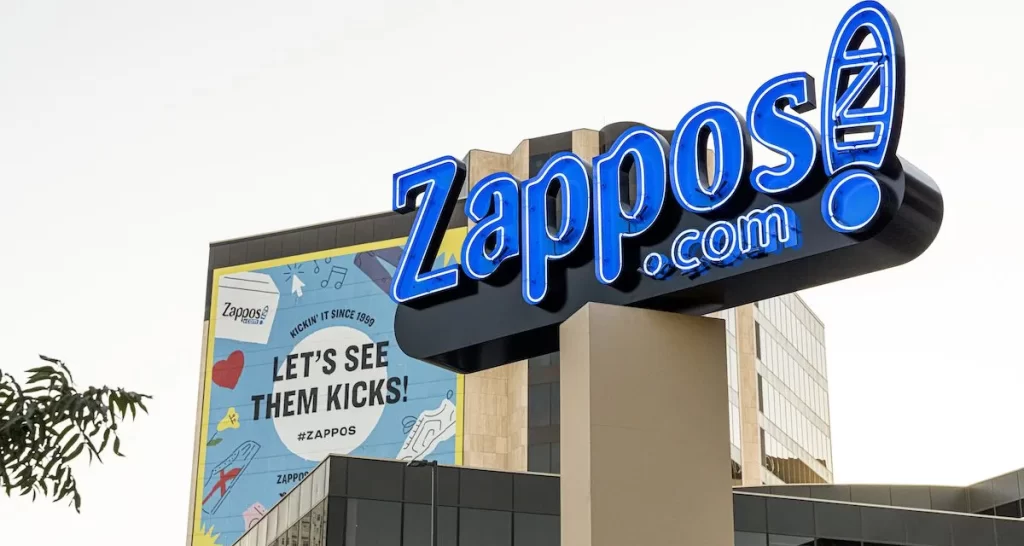Once a niche online shoe retailer, Zappos has transformed into a company synonymous with exceptional customer service and a happiness-focused company culture. Founded in 1999, Zappos began as ShoeSite.com, a name reflecting its initial focus. However, the company quickly pivoted to its current moniker, inspired by the Spanish word for “shoes,” “zapatos.” While shoes remain a core part of their business, Zappos has expanded its offerings to include clothing, handbags, accessories, and more. However, what truly sets Zappos apart is its unwavering commitment to delivering happiness, not just through its products, but through every touchpoint of the customer experience. This in-depth look at Zappos will explore the company’s journey, its core values, and how it continues to redefine online retail.
The story of Zappos starts with Nick Swinmurn, who, frustrated by the limitations of traditional shoe shopping, envisioned a more convenient online alternative. Swinmurn partnered with Tony Hsieh and Alfred Lin, securing $2 million in funding through their investment firm Venture Frogs. Officially launched in 1999, Zappos faced the challenge of establishing itself in a nascent e-commerce landscape. The company’s early success can be attributed to its focus on building a vast inventory, offering competitive prices, and providing exceptional customer service.

As Zappos gained traction, it became evident that customer service was more than just a department; it was a core philosophy. Zappos famously empowered its employees to go the extra mile for customers, fostering a culture that encouraged exceeding expectations and creating memorable experiences. This dedication to exceeding expectations became a cornerstone of the Zappos experience, with stories of employees singing opera on the phone or sending birthday cakes to loyal customers becoming legendary. This unconventional approach resonated with customers, fostering brand loyalty and positive word-of-mouth marketing.
Zappos recognized that its employees were the key to delivering happiness. The company implemented a unique hiring process that prioritized cultural fit over traditional qualifications. Applicants were evaluated on their passion, service orientation, and ability to embrace the company’s quirky and fun-loving culture. This resulted in a team that was not only skilled but also genuinely enthusiastic about the Zappos mission. To further cultivate this passion, Zappos offered a unique perk: after a short onboarding period, new hires were given the opportunity to resign with a severance package if the company culture wasn’t a good fit. This unconventional approach ensured that only those who truly aligned with the Zappos way of life remained.
In 2009, e-commerce giant Amazon acquired Zappos for a staggering $1.2 billion. Crucially, the acquisition came with the understanding that Zappos would retain its unique culture and operational autonomy. This allowed Zappos to continue innovating and delivering happiness under the Amazon umbrella. Today, Zappos operates as a subsidiary of Amazon, leveraging the resources of the larger company while staying true to its core values.
While its roots lie in footwear, Zappos has continuously evolved. The company has expanded its product offerings to cater to a wider audience, demonstrating its adaptability and commitment to customer needs. Looking ahead, Zappos is likely to continue innovating and exploring new avenues to deliver happiness. Whether it’s through expanding its product range, implementing cutting-edge technologies, or further refining its customer service approach, Zappos remains dedicated to its core mission: delivering happiness through every interaction.
Marketing Strategy of Zappos
While exceptional customer service is at the heart of Zappos’ success, their marketing strategies have also played a crucial role in building brand awareness and customer loyalty. Here’s a closer look at some of their key approaches in marketing strategies:
1. Customer-Centric Culture
Zappos has revolutionized customer service, turning it into a powerful marketing strategy. Their core principle is to “deliver WOW through service”. This translates into a unique approach where customer happiness reigns supreme.
Instead of focusing on metrics like high call volume or quick resolutions, Zappos invests heavily in its employees. Four weeks of in-depth training equips call center agents to solve problems and create a positive experience. Agents are empowered to ditch scripts and upselling, allowing them to devote 80% of their time on genuine customer interactions.
Zappos goes beyond expectations to create a memorable experience. They provide 24/7 phone support with unlimited call lengths, free two-way shipping, and an unmatched 365-day return policy. Their dedication extends to patience with unusual requests and a willingness to go the extra mile, like surprising customers with expedited shipping upgrades. By prioritizing customer delight, Zappos fosters brand loyalty and positive word-of-mouth marketing, making their customer-centric culture a strategic triumph.
2. Free Shipping and Returns
Zappos leverages free shipping and returns as a strategic marketing tool to build customer confidence and loyalty. This customer-centric approach sets them apart from competitors and reinforces their commitment to a positive shopping experience.
Since its early days, Zappos understood the need for exceptional service in the crowded online shoe market. They eliminated the barrier of upfront shipping costs by offering free standard shipping on all orders. Additionally, some customers even qualify for free expedited shipping. This encourages browsing and experimentation without worrying about added fees.
But their strategy goes beyond initial purchase. Zappos’ generous 365-day return policy empowers customers to shop with confidence. They can try on items at home, compare them, and return anything unworn in original condition for a full refund (with some exceptions for final sale items). This minimizes risk and encourages repeat purchases, solidifying Zappos’ position as a trusted online retailer with a focus on customer satisfaction.
3. Wide Product Selection
Zappos strategically utilizes a vast and diverse product selection as a marketing tool to cater to a wide range of customers. This one-stop-shop approach simplifies the shopping experience for consumers by offering a comprehensive selection of shoes, clothing, accessories, handbags, and even home goods. This breadth allows customers to fulfill various needs within a single platform, fostering convenience and loyalty.
Beyond just variety, Zappos understands its target audience. Customer data analysis informs their behavioral and attitudinal segmentation, allowing them to curate product offerings that resonate with specific demographics. This ensures their extensive inventory remains relevant and caters to customers who value quality and a curated shopping experience. While the text doesn’t mention price sensitivity, the wide selection likely attracts a broader range of income levels, with some items appealing to those with higher disposable income seeking premium brands.
4. Innovative Marketing Campaigns
Zappos consistently pushes boundaries with innovative marketing campaigns. Personalization is a key theme. They target specific demographics with exclusive offers, like discounts for students and veterans. They even launched Zappos Adaptive, a line for people with disabilities, demonstrating their commitment to inclusivity. These initiatives build brand loyalty by showing they value their customers as individuals.
Engagement is another pillar of Zappos’ marketing strategy. Their interactive spring trend initiative allowed users to customize virtual looks, fostering a fun and memorable experience. High standards for social media ensure prompt and helpful responses to inquiries, turning every interaction into a potential positive touchpoint. These efforts create a sense of community and keep customers coming back.
Looking beyond individual campaigns, Zappos’ marketing strategy emphasizes building long-term relationships. They invest in partnerships and exceptional customer service, prioritizing trust and mutual benefit. This focus on customer delight fuels positive word-of-mouth marketing, as satisfied customers become brand advocates. By combining personalization, engagement, and relationship-building, Zappos’ innovative marketing strategy fosters a loyal customer base.
5. Brand Loyalty Programs
Customer loyalty is a cornerstone of Zappos’ marketing strategy, and their Zappos VIP program is a key tool. This free program rewards members with points for purchases and promotional activities. Points translate into redeemable VIP codes for discounts on future purchases, incentivizing repeat business. The program also offers tiered benefits, with higher tiers unlocking perks like free expedited shipping and faster refunds. This structure encourages customers to engage more with the brand to reach higher tiers and unlock greater rewards.
Beyond VIP points, Zappos Rewards offers additional benefits to members, such as free shipping and returns. These perks remove friction from the shopping experience, further encouraging customer loyalty. By combining a points-based program with additional benefits, Zappos’ loyalty program effectively motivates customers to return and establish long-lasting relationships with the brand.
6. Word-of-Mouth Marketing
Zappos leverages the power of word-of-mouth marketing to cultivate a community of loyal customers. They achieve this through exceptional customer service. Their commitment goes beyond just resolving issues. They strive to surprise and delight customers, like sending flowers to a customer with injured feet. These unexpected gestures create positive experiences that customers are naturally inclined to share with others.
Employee engagement fuels Zappos’ word-of-mouth strategy as well. They encourage employees to share their experiences on social media, fostering a sense of transparency and authenticity. This allows potential customers to see the positive company culture firsthand, building trust and brand advocacy.
Finally, Zappos prioritizes customer experience over traditional advertising. They believe in the power of repeat customers as their true marketing force. By investing in exceptional service and fostering positive interactions, they encourage customers to spread the word organically, creating a loyal and vocal brand following.
7. Social Media Engagement
Zappos utilizes social media engagement to cultivate strong customer relationships and build brand loyalty. They prioritize being present wherever their customers are. By using multiple platforms, they ensure maximum reach and visibility. Engaging content, like questions and glimpses into their company culture, fosters interaction and keeps customers interested. This approach allows them to connect with customers on a more personal level.
Exceptional customer service is another key element of Zappos’ social media strategy. They go beyond simply broadcasting messages. They actively respond to comments and inquiries, providing prompt and personalized support through direct links. This responsiveness builds trust and demonstrates their commitment to customer satisfaction. By combining engaging content with exceptional service, Zappos leverages social media to create a positive and interactive online community.
By implementing these creative and customer-centric marketing strategies, Zappos has carved a unique niche in the online retail space. Their focus on happiness goes beyond exceptional service, extending to the way they interact with customers, build relationships, and create a memorable brand experience.
Also Read: Marketing Strategies and Marketing Mix of New Balance
To read more content like this, subscribe to our newsletter
Go to the full page to view and submit the form.

